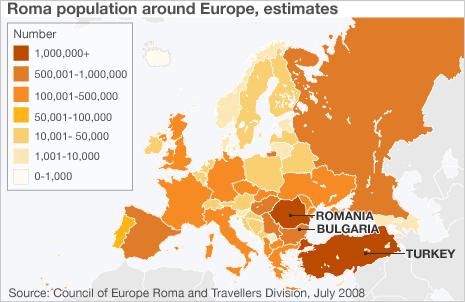French ministers fume after Reding rebuke over Roma
- Published

Some 230 Roma were deported from France by air on Tuesday
The two cabinet ministers at the heart of France's Roma (Gypsy) deportation policy have angrily rejected criticism from the EU justice commissioner.
Pierre Lellouche, responsible for European affairs, accused Viviane Reding of making a "gaffe" by drawing parallels with Nazi-occupied Europe.
Immigration Minister Eric Besson said France respected EU laws.
France has removed at least 1,230 east European Roma since July, accusing them of settling illegally.
The office of President Nicolas Sarkozy described Ms Reding's comments as "unacceptable" and called for a calm discussion rather than the stirring-up of a "sterile controversy".
Ms Reding had urged the European Commission to take legal action against France over its deportations, describing them as a "disgrace".
She deplored the fact that a leaked official memo had contradicted assurances given to her by France that the Roma were not being singled out.
"This is a situation I had thought Europe would not have to witness again after the Second World War," she said.
In a BBC interview later, she also suggested the French government was carrying out the policy "for purely populist reasons and party political reasons".
European Commission President Jose Manuel Barroso told reporters on Wednesday that Ms Reding had his personal backing though "one or other of the expressions used may have given rise to misunderstanding".
"Prohibition of discrimination based on ethnic origin is one of the EU's fundamental values," he added.
Mr Sarkozy has said he will explain himself at a summit of EU leaders in Brussels on Thursday, although the situation of the Roma is not on the agenda, the BBC's Oana Lungescu reports.
But with Mr Barroso sitting at the table, along with the Romanian and Bulgarian leaders, the summit could see more angry exchanges over what to do with Europe's travelling people, she says.
'That's enough'
Speaking on French radio on Wednesday, Mr Lellouche appeared to take personal offence at the suggestion his government was acting like France's wartime Vichy regime, which rounded up thousands of Roma, some of whom were sent to Nazi death camps.
"As a French minister, as a French citizen, as the son of somebody who fought in the Free French Forces, I cannot let Ms Reding say that the France of 2010, in dealing with the issue of the Roma, is the France of Vichy," he said.
Roissy airport, Paris, was "not Beaune-La-Rolande or Drancy", he said, referring to wartime French internment camps.
France has been deporting by air Romanian and Bulgarian Roma who agree to be repatriated in exchange for cash payments of about 330 euros ($423, £274) per adult and 100 euros per child.
"A nest egg, an air ticket for the country of origin in the European Union is not the death trains, it's not the gas chambers," Mr Lellouche remarked.
The minister suggested the justice commissioner had overstepped her brief.
"The Commission cannot set itself up as a critic of states," he said.
"That's enough, my patience is wearing thin. You don't address yourself like that to a great state such as France, which is the mother of human rights, which is a founding member of the European Union."
Directives 'breached'
Speaking in a separate radio interview, Immigration Minister Mr Besson said: "She [Ms Reding] wants to know whether France has respected EU law and its own legislation, and the answer is 'yes, France has respected that'."
An editorial in the centre-right newspaper Le Figaro robustly defended the government and asked the European Commission to "stop acting as if the problems posed by immigration did not exist".
President Sarkozy himself reportedly suggested at a luncheon with his political allies in Paris that Ms Reding's native Luxembourg could take in some Roma.
"He said that... if the people of Luxembourg wanted to take them, there was no problem," Senator Bruno Sido was quoted as saying by AFP.
Mr Sarkozy's reported remarks were later taken up by Luxembourg Foreign Minister Jean Asselborn, who described them as "spiteful".
Catherine Barnard, professor of European law at the UK's Cambridge University, told the BBC she believed that France had not complied with the EU's citizens' rights directive in respect to Roma people who were EU citizens.
France, she told BBC World Service, did not seem to be considering each case on its merits and did not seem to be taking into account the fundamental rights of the Roma.
EU anti-discrimination directives would also have been breached if the Roma had been targeted as a distinct ethnic group, she added.
Ms Reding's strong stance was welcomed by a federation of 22 Roma civic organisations in Romania.
"For the first time, the EU is sending clearly and unequivocally a powerful message that the fundamental rights of Roma must be respected," it said.

- Published19 October 2010
- Published14 September 2010
- Published6 September 2010